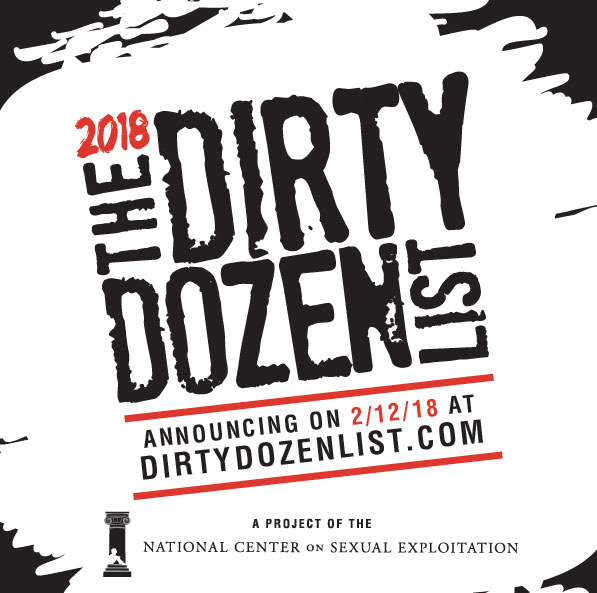
WASHINGTON (BP) — Four of Hollywood’s leading men accused of various forms of sexual abuse are targeted in an advocacy group’s 2018 Dirty Dozen list of major contributors to sexual exploitation.
 The National Center on Sexual Exploitation (NCOSE) dubbed Harvey Weinstein, Kevin Spacey, Woody Allen and James Franco “the poster boys of #MeToo” and, in adding them to the list, broke with NCOSE tradition of placing only corporations on the list of offenders NCOSE has named annually since 2013.
The National Center on Sexual Exploitation (NCOSE) dubbed Harvey Weinstein, Kevin Spacey, Woody Allen and James Franco “the poster boys of #MeToo” and, in adding them to the list, broke with NCOSE tradition of placing only corporations on the list of offenders NCOSE has named annually since 2013.
“These four men have used their power to both harass and abuse others, in addition to shaping America’s cultural acceptance of sexual exploitation through their professions in the media,” Haley Halverson, NCOSE vice president of advocacy and outreach, said in releasing the list Feb. 12. “While to some the MeToo Movement seems like it spontaneously erupted, we see it as a symptom of a deeply entrenched culture of sexual objectification and violence.”
The four men have variously admitted to and denied the charges that have been numerous and most visible since October 2017, with Allen continually denying allegations of pedophilia and Franco denying charges of sexual abuse allegedly committed on the sets of films. None of the four men has been convicted of sex crimes, although New York State Attorney General Eric Schneiderman’s office filed a lawsuit Feb. 4 against the Weinstein Company, alleging numerous civil rights, human rights and business law violations. The company broke the law as Harvey Weinstein pursued sexual conquests with women in his employ and others in the movie industry, according to the lawsuit.
“The Dirty Dozen List is an activism tool that gives back power to individuals who want a voice in the culture,” NCOSE said. The list “has a track record of uniting thousands of individual actions and targeting them to create monumental changes, such as policy improvements at Google, Hilton Worldwide, Verizon, Walmart, and the Department of Defense.”
Companies named for at least two consecutive years to the list are online retailer Amazon, advertising website Backpage.com, EBSCO Information Services, the HBO television network, Roku media streaming company, the Snapchat app and Google’s online YouTube channel.
Others on the 2018 list are the Apple iBooks app, technology giant Comcast, Steam online video game distributors and the Twitter communications platform.
NCOSE encouraged the public to use such tools as email and social media to campaign for change. For example, after NCOSE called out Hilton and other hotel chains for offering porn-on-demand channels in guest rooms, Hilton’s corporate offices began receiving 1,000 complaint emails a week, reached out to NCOSE for a solution and stopped selling porn, NCOSE executive Dawn Hawkins said.
“As a result, Hilton saw their influence and they made a change,” said Hawkins, NCOSE senior vice president and executive director. “So we’re asking you and every member of the public to get involved.”
In its 2018 accusations, NCOSE said Amazon sells materials that sexualize, objectify and commodify children and women. Backpage.com is known as a prostitution hub; Comcast provides access to hardcore porn; and EBSCO provides public and private schools “easy access to hardcore pornography sites and extremely graphic sexual content,” NCOSE said.
HBO “has reached a new low as it turns torture porn into popular entertainment”; Roku allows users to access hardcore porn through “hundreds of private and hidden channels”; Snapchat lets users economically profit from the exchange of sexual content; and YouTube fails to monitor and restrict sexually graphic content, NCOSE said.
NCOSE called out iBooks for providing erotic literature that supports violence and racially based rape; Comcast for profiting from sexual exploitation; Steam for promoting nudity and sexual content in video games to its 35 million users; and Twitter for accepting accounts that advertise porn and online prostitution.
Other details of the accusations and NCOSE’s examples of corporate changes are available at DirtyDozenList.com.
















